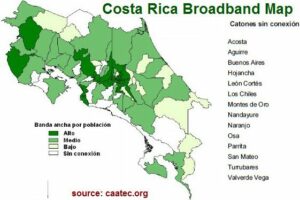Results of the Cisco Costa Rica Broadband Barometer Project reported a 27.3 percent growth in fixed broadband connections in Costa Rica during the first half of 2009.
 The increase in broadband connections was mainly in the enterprise and home segments. According to the study, prepared by the Costa Rican High Technology Advisory Committee (La Fundación Comisión Asesora en Alta tecnología or CAATEC) and sponsored by Cisco, Costa Rica reached 270,757 fixed connections and a 5.8 percent penetration in its population.
The increase in broadband connections was mainly in the enterprise and home segments. According to the study, prepared by the Costa Rican High Technology Advisory Committee (La Fundación Comisión Asesora en Alta tecnología or CAATEC) and sponsored by Cisco, Costa Rica reached 270,757 fixed connections and a 5.8 percent penetration in its population.
The Cisco Broadband Barometer analyzed broadband penetration in public and private schools in the country. Public and private schools experienced a 15 percent and 27 percent broadband growth, respectively, during the first half of 2009.
Despite the growth, Costa Rica still needs around 52,000 new broadband connections to reach the goal defined by the Cisco Broadband Barometer in conjunction with the government. That goal is 325,000 connections and 7 percent broadband penetration by 2010.
Highlights:
- Nearly 52,000 connections were added to the fixed broadband market in Costa Rica during the first half of 2009. There was a 17.7 percent growth in connections with speeds between 512 kilobits per second (Kbps) and 1 megabit per second (Mbps) during the first half of 2009.
- Connections with speeds between 512 Kbps and 1 Mbps represent 37 percent of the fixed broadband market. Connections with speeds higher than 1 Mbps represent only 27.7 percent. The home segment continued to concentrate the majority of fixed broadband connections during the first half of 2009, reaching 206,877 connections and attaining a 23 percent growth.
- The enterprise segment experienced 28.6 percent growth during this same period.
- Broadband connections continue to concentrate in the urban areas. The cantons with the greatest penetration were Montes de Oca (20 percent), Escazu (19.4 percent) and Santo Domingo (17 percent). The cantons with less penetration were San Mateo, Guacimo and Coto Brus, with only 0.7 percent penetration.
- ADSL connections grew 32.2 percent and cable modem grew 19.8 percent. In the educational system. 39 percent of public schools and 61 percent of private schools have broadband connections.
- The majority of public and private schools in the country have connections with speeds between 256 Kbps and 512 Kbps.
- Mobile Internet is still at an early stage in Costa Rica, with only 6 percent of GSM cell phone lines having Internet access activated.
- There are still 52,243 connections needed to reach the goal defined by the Cisco Broadband Barometer: 325,000 connections and 7 percent broadband penetration by 2010.
